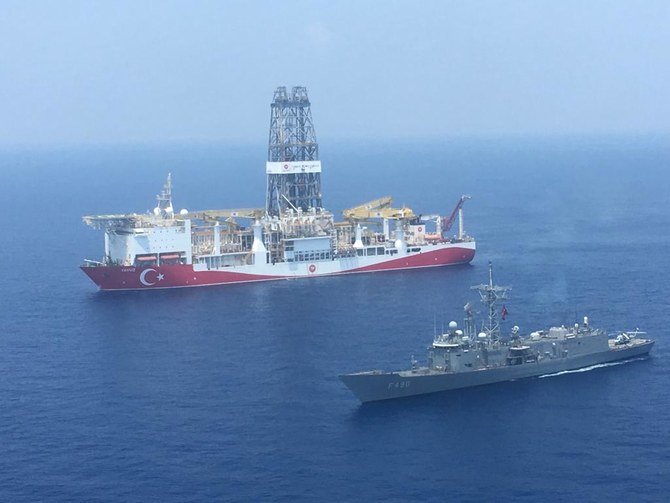
- ARAB NEWS
- 18 Jul 2025

Saudi Arabia’s declaration last week that it supports the “the full sovereignty of Cyprus over its territories” may one day prove to have been the harbinger of a significant change in the strategic balance of the eastern Mediterranean, and even the Middle East.
It came amid a flurry of diplomatic activity that included a visit to Greece by the Saudi foreign minister and a visit to Riyadh by the Cypriot foreign minister. The Greek government even pledged the deployment of its Patriot missiles to Saudi Arabia to help boost air defenses. It is clear that what is driving all this is widespread regional unease with Turkey’s increasingly assertive role in the Middle East and the eastern Mediterranean.
Increasingly, the Saudis and the Turks find themselves on opposing sides of many current disputes and developments. These range from Egypt, where Turkey supported the Muslim Brotherhood government of Mohammed Morsi while Saudi Arabia backed the current leadership of Abdel Fattah El-Sisi; to Libya, where the two countries are assisting different claimants to legitimacy; and to Qatar, the subject of a boycott by Saudi Arabia and other Gulf states but supported by Ankara.
In both Qatar and Libya, Turkey has appeared to flex its muscles by deploying troops. Nor can its regional rivals be happy with Turkish attempts at building bases in Somalia and Sudan.
Moreover, Turkey and Libya’s Government of National Accord in Tripoli have agreed on an “exclusive economic zone” in the Mediterranean that flouts international law; Ankara is increasingly using its navy to protect its drilling ships in the Mediterranean and threaten those of other countries; and finally, Turkey intervened in the Syrian conflict despite the opposition of Washington and Brussels. All of this is seen not just by Riyadh but also by many in the region, including the UAE and Egypt, as an indication that Turkish President Recep Tayyip Erdogan wants to elevate Turkey into a local dominant force, and perhaps the leader of the Muslim world.
Erdogan certainly intends to “make Turkey great again;” from the moment he became prime minister in 2003 he has articulated his belief that for far too long Turkey has been relegated to a secondary role in international politics, and that given its economic and military prowess and strategic location it deserved to be a rule maker and not just a consumer of rules. In addition, Erdogan’s vision for Turkey is part and parcel of his vision of his own historical role, domestically and internationally. Implementation of policy has been made much easier by the complete control Erdogan has achieved over politics at home.
In both Qatar and Libya, Turkey has appeared to flex its muscles by deploying troops. Nor can its regional rivals be happy with Turkish attempts at building bases in Somalia and Sudan.
Henri J. Barkey
Erdogan exploited the horrible murder in Istanbul of Jamal Khashoggi, which he viewed as the perfect tool with which to try to undermine Crown Prince Mohammed bin Salman — viewed by Erdogan as an ambitious leader both willing and able to stand up to him.
It is quite possible that the new Saudi discourse on Cyprus is a response to Erdogan’s aggression, and a way to target Turkey’s vulnerability. Cyprus, especially the Turkish-run Turkish Republic of Northern Cyprus (TRNC), continues to represent a bitter disillusionment for Ankara. No one but Turkey recognizes the TRNC, an occupied enclave in the north of the island, and the Republic of Cyprus managed to be admitted into the European Union as the sole representative of Cypriots. One of the few groups that gave the TRNC support was the Organization of Islamic Cooperation (OIC), with which it had secured observer status. As late as the May 2019 OIC summit, missed by Erdogan, the communique strongly supported the Turkish Cypriot position.
Saudi Arabia remains the most important OIC member. While it is unlikely that the OIC will vary its future pronouncements dramatically, the fact remains that Saudi support for Cyprus in general and its expressed concerns over eastern Mediterranean developments is a significant warning to Ankara. In effect, Riyadh has indirectly endorsed the Egyptian-Greek-Cypriot-Israeli position in the Mediterranean.
Saudi endorsement — albeit indirect — of Israeli positions against Turkey also demonstrate how differently Riyadh views those two countries. Understandably, the Saudis have always opposed Israel and Israeli policies over the Palestinian question. Yet they clearly are not threatened by Israel, while they are by Turkey. In the end, the enemy of my enemy is my friend … sort of.